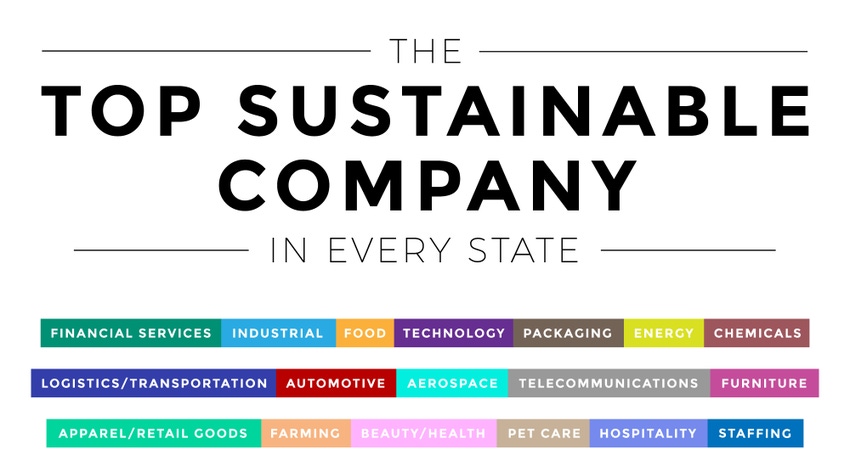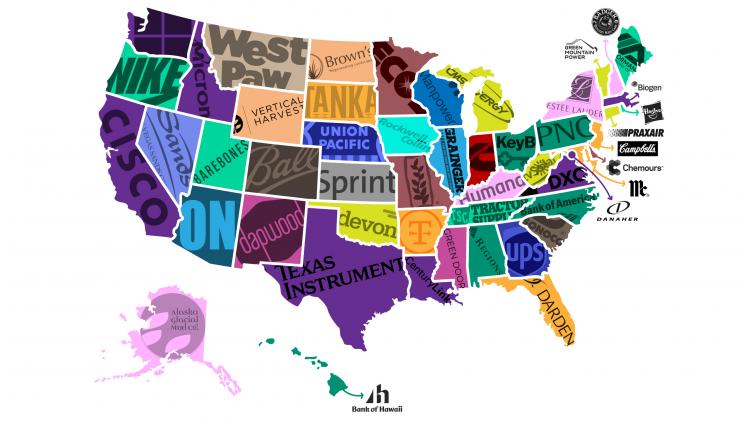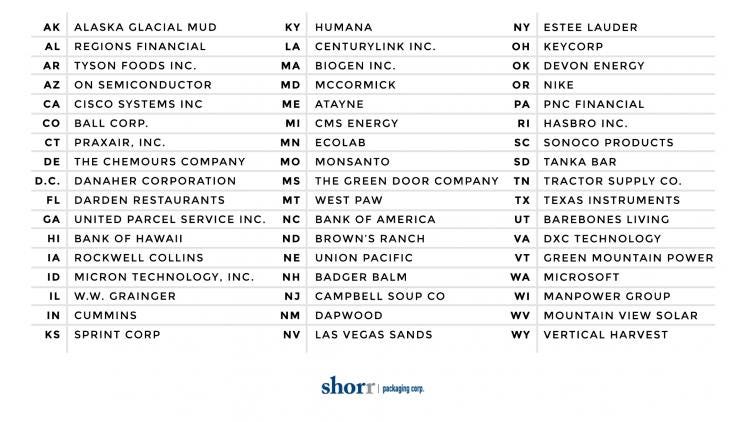Top sustainable companies by state
July 25, 2019

An infographic of the top sustainable companies from each state includes those familiar to packaging professionals as either brands or vendors.
There are any number of ways to view the sustainable packaging market including by market, material type and a host of other variations. Which is why there are numerous research reports about sustainability that also extends far beyond the relative constraints of packaging.
Distributor Shorr Packaging took an interesting and colorful geographic approach to the latter in creating and publishing an infographic that lists the top company from each state as judged by sustainable practices, drawn from four key industry studies: Newsweek’s Top 500 Global Companies rankings, Barrons’ “100 Most Sustainable U.S. Companies” list, Corporate Knights’ “2019 Global 100” ranking, and Rubicon’s “Top Sustainable Small Businesses in Each State” list. Companies in each state were determined by their ranking in each list and/or their combined rankings if the state was featured in multiple lists.
The result is a colorful map of the United States where each particular state winner’s brand logo appears within the familiar state outline. Notably, several consumer packaged goods companies and packaging vendors are recognized. Examples of major brands that were mapped include Campbell’s (NJ), Estee Lauder (NY), Nike (OR), and Tyson’s (AR).


Campbell’s, for example, was named in January one of the Top 100 World’s Most Sustainable Corporations by Corporate Knights whose criteria included transparency.
In fiscal year 2018, Campbell’s reported in its 2019 Corporate Responsibility Report that it reduced greenhouse gas emissions, diverted 92% of waste from landfills and made further progress on measuring and reducing food waste. In 2018 it had transitioned 100% of its cans to non-Bisphenol-A lined. You can read more about Campbell’s packaging developments published by Packaging Digest here.
Campbell’s was one of 22 U.S. companies that made the Top 100 list and one of only two U.S. food companies singled out, the other being McCormick & Co. (MD). It seems since the hiring four-and-a-half years ago of Michael Okoroafor as the spice brand’s VP, global sustainability & packaging innovation, the spice maker has been making sustainability a more essential ingredient in its packaging, too. In 2018, McCormick made a bold public commitment to 100% plastic packaging that can be reused, recycled or repurposed by 2025. The company has furthered its plastics focus by joining The New Plastics Economy Global Commitment, led by the Ellen MacArthur Foundation.
You can read more about the brand’s packaging efforts on the pages of Packaging Digest here.
Supply-side sustainability
Several packaging vendors made the cut including Sonoco Products (SC) and Ball Corp. (CO).
Sonoco, a packaging supplier in consumer, industrial, display and protective solutions markets, had $5.4 billion in net sales in 2018 using formats that include flexible packaging and rigid plastic and paper containers. In a recent presentation to analysts, Sonoco noted that it is committed to increasing the use of post-consumer recycled resins in its plastic packaging from 19% to 25% by 2025 and is ensuring that approximately 75% of its global rigid plastic packaging can make the capable of make the on-package recyclable claim by 2025.
Ball operates in the packaging and aerospace markets, though it is far better known to readers as a major supplier of aluminum cans for beverages and aerosols. Last fall, John A. Hayes, Ball chairman, president and chief executive officer, said this: “Packaging is critical to delivering consumer products safely, conveniently and in good condition. And cans truly are the most sustainable package—economically and environmentally—relative to glass, plastic and other substrates, enabling a circular economy. We are making meaningful progress in implementing sustainable business practices, further enhancing the sustainability credentials of metal packaging along the value chain, and transitioning to a low carbon economy, including our recently announced science-based greenhouse gas emission reduction target."
One of Ball’s most recent sustainable initiatives is the April announcement that it has made two virtual power purchase agreements (VPPAs)—one wind and one solar—for 388 megawatts (MW) of new renewable energy that allows it to address 100% of the North American electricity load utilized in its corporate, packaging and aerospace operations by the end of 2021.
Bigger and smaller
The map was compiled regardless of company size, for example along with well-known large companies you’ll find lesser knowns like Badger Body Care, NH, a small family-owned brand that “only uses ingredients that fit our rigorous natural standards for healthy agriculture, minimal processing, sustainable supply chain, and health-giving properties.” The apparent lone bow to packaging at the company website found on the FAQs page answered a question if BPA was in the company’s plastic tubes with the answer that “no, they are BPA- and phthalate-free.”
Another smaller packaged goods brand, Tanka, represented the state of South Dakota. Brand owner Native American Natural Foods, LLC “is focused on creating a family of nationally branded buffalo-based food products that are delicious and that promote a Native American way of wellness that feeds mind, body, and spirit.” The products, which are gluten-, nitrate-, MSG- and hormone-free, are offered as packaged bars, bites and sticks.
I checked my birth state of Iowa, where Rockwell Collins heads the list—I frankly didn’t know an avionics company had a presence in the Hawkeye state. I also found in my home state of Illinois that Grainger Industrial Supply tops the crop of sustainable leaders.
See what company leads your particular state or if you see anything worth commenting on—if so, please post your remarks below.
We split the infographic into three parts for this article, but to view the entire infographic intact with a summary explanation visit the Shorr site here.
You May Also Like


